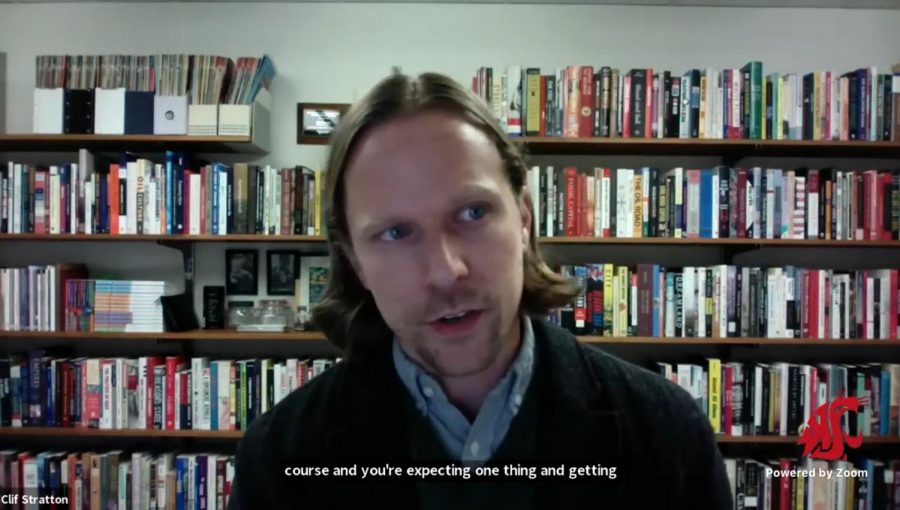Faculty Senate discusses new UCORE category
Senators voted to discontinue interior design degree at WSU Spokane, add requirements for certificates
UCORE Director Clif Stratton discusses a new proposed UCORE category during a WSU Faculty Senate meeting on Thursday.
November 20, 2021
WSU Faculty Senate discussed during a Thursday meeting a proposal to add another UCORE category called equity and justice.
Adding an equity and justice UCORE category will help clarify the content of certain courses, said Clif Stratton, UCORE director and history professor.
“Many of these courses that might become equity and justice courses are already being offered as diversity courses,” Stratton said.
Equity and justice courses would focus on inequalities and issues of power, while diversity courses would focus on exploring different worldviews and cultures, he said. The 2017 revision to the diversity course description attempted to capture a diverse swath of courses that were not transparent to students or to faculty teaching the courses.
“This proposal is an effort to be far more transparent than that process was,” Stratton said.
Vilma Navarro-Daniels, senator and professor of Spanish and American Studies and Culture, raised concerns that the proposed change was rooted in activism.
“At the end of the day, if someone wants to be part of a social movement [that] should be something that the person decides on [their] own,” Navarro-Daniels said.
The proposal will be voted on during the senate’s meeting on Dec. 9.
Action items
The Senate unanimously voted to discontinue the bachelor of arts degree in interior design at WSU Spokane.
The Senate unanimously voted to rename the doctorate and master’s of science in veterinary sciences to biomedical sciences.
Kathryn Meier, professor at the Elson S. Floyd College of Medicine, expressed full support on the name change on behalf of the college.
The Senate unanimously voted to add several new courses, including Protein Bioengineering, Introduction to Cyber Security 3 and Drugs in World History 3. They also voted to add several new kinesiology courses.
The Senate approved new requirements for students receiving certificates in quantitative biology and elementary education. There will also be new requirements for students pursuing a minor in Interior Design.
Discussion items
The Senate discussed the proposal to add a bachelor of arts in chemistry to WSU Vancouver. Cigdem Capan, senator and WSU Tri-Cities physics professor, asked why a bachelor of arts was being added instead of a bachelor of science. She said she wanted to know if a bachelor of arts would ultimately hurt students applying to graduate school.
The decision to offer a bachelor of arts of chemistry instead of a bachelor of science is because of insufficient staff at WSU Vancouver, said Elsa Silva-Lopez, WSU Tri-Cities chemistry professor.
WSU Vancouver is in the process of hiring two full-time faculty members and several adjunct professors by fall 2023 to support the bachelor of arts, Silva-Lopez said. The hiring schedule may need to be moved up if WSU Vancouver expects to offer the bachelor of arts beginning in fall 2022, Silva-Lopez said.
Constituent concerns
WSU recently had an issue with a graduate student receiving insufficient health insurance coverage, said Michael Neff, senator and professor of molecular science.
The student had a condition that impaired his ability to think clearly and perform doctorate candidate-level work, Neff said. A doctor recommended a certain procedure that was not covered by the student’s insurance. The student’s adviser found out University of Washington graduate students are covered by the school for the particular procedure while WSU graduate students are not.
“It becomes a recruitment issue,” Neff said. “We don’t want to lose students to another university that is across the state.”
Faculty Senate Chair Doug Call relayed a conversation he had with President Kirk Schulz and Provost Elizabeth Chilton regarding certain staff being underpaid and denied raises. This was a widespread concern brought up at the Nov. 4 meeting.
Schulz and Chilton asked him to keep track of the number and characteristics of individual cases of undercompensated staff who are being denied raises, Call said.
Call asked faculty senators to email any instances to him so he can collect some hard data for Schulz and Chilton regarding the scope of the problem.
Special presentation
Senators heard a presentation from Colleen Kerr, vice president for external affairs and government relations, about WSU’s approach to the upcoming state legislative session and general approach to engaging WSU stakeholders and constituents. Kerr delivered the same presentation to the Board of Regents at their meeting in Vancouver an hour earlier.
Kerr shared how WSU seeks to interact with as many stakeholders as possible, including students, faculty, alumni, businesses and the media.
“We are doing everything we can so that we are elevating the visibility of WSU in terms of our academic priorities and our mission so that when policymakers are making decisions, it is easy for them to make a decision that supports WSU,” she said.












